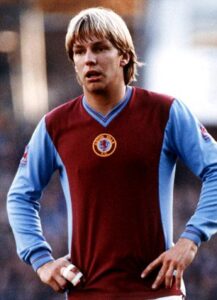Dave Woodhall pays tribute to the immortal Gary Shaw.
It’s somehow ironic that the initial, premature reports of Gary Shaw’s death arrived on what would have been Sir Graham’s eightieth birthday. Both men were iconic figures in the Villa’s history and their careers with the club briefly coincided. You can only wonder what might have transpired had they both been around for longer.
Gary made his first team debut at home to Bristol City in August 1978, aged seventeen, but made his mark the following season. Replacing Brian Little, another Villa legend whose career ended prematurely through injury and who many years later he still referred to as his idol, Gary became a regular in the Villa side that was being rebuilt to conquer Europe.
The following two seasons saw the team and Gary hitting the heights. He was PFA Young Player of the Year for 1980-81 and won the Bravo award for the best youngster in European competitions the following season. Subsequent winners included Marco van Basten, both Ronaldos and Lionel Messsi.

Gary’s highest goals tally came in 1982-83, when he scored 24 including one in the Super Cup against Barcelona and at the end of the season he went on the England tour of Australia & New Zealand. Even more inexplicable than not going to the previous year’s World Cup, Gary still didn’t win his first cap on this trip. “All that way and I never got a kick,” he later said ruefully.
And neither would he get another chance. An injury against Forest early in 1983-84 effectively ended his career at the top. To his credit Gary continued to plug away at attempting a comeback, staying with Villa until 1988 when at any time he could have retired with a testimonial and an insurance payout. Even after he left Villa Gary continued to play. He signed for clubs in Denmark and Austria before returning home for spells with Walsall, Kilmarnock and Shrewsbury, where he scored what was then the quickest hat-trick ever recorded in league football. His last club was in Hong Kong and after finally giving up playing he was a coach with Villa and then employed as a statistics analyst.
Even more than his footballing ability though, Gary was an icon, a symbol of the time when Birmingham was dominant. Industry may have been decimated, unemployment was rising but we had the best team in Europe, and also the livliest music scene. Duran Duran, Dexy’s, UB40 were all making their mark at the time and the Villa were at the summit. It was an era that the city had never seen before, and it hasn’t been repeated since.
These days £100 million seems to be the benchmark for a world-class player’s transfer fee. A club would pay that for Gary’s image rights alone. If he was around now he’d be one of the biggest names in world football, a superstar who transcended sport. You can only imagine the sort of money he’d earn, and yet despite missing out on all that, despite injury curtailing a career that should by rights have seen him win fifty or sixty caps and have his pick of the richest clubs in Europe, there was never any bitterness about Gary.
You’d see him down the match, or having a drink in a local pub, not hogging the limelight but with a word for anyone who sought him out. The last time I spoke to Gary properly was a couple of years ago, and with perfect timing it was on 26th May. I was walking through the city centre when we saw each other and stood on the pavement talking for what seemed hours. A legend and a fan, tranformed again to that starstruck, tongue-tied teenager who first saw Gary Shaw playing for the Villa and wished I could be like him.

